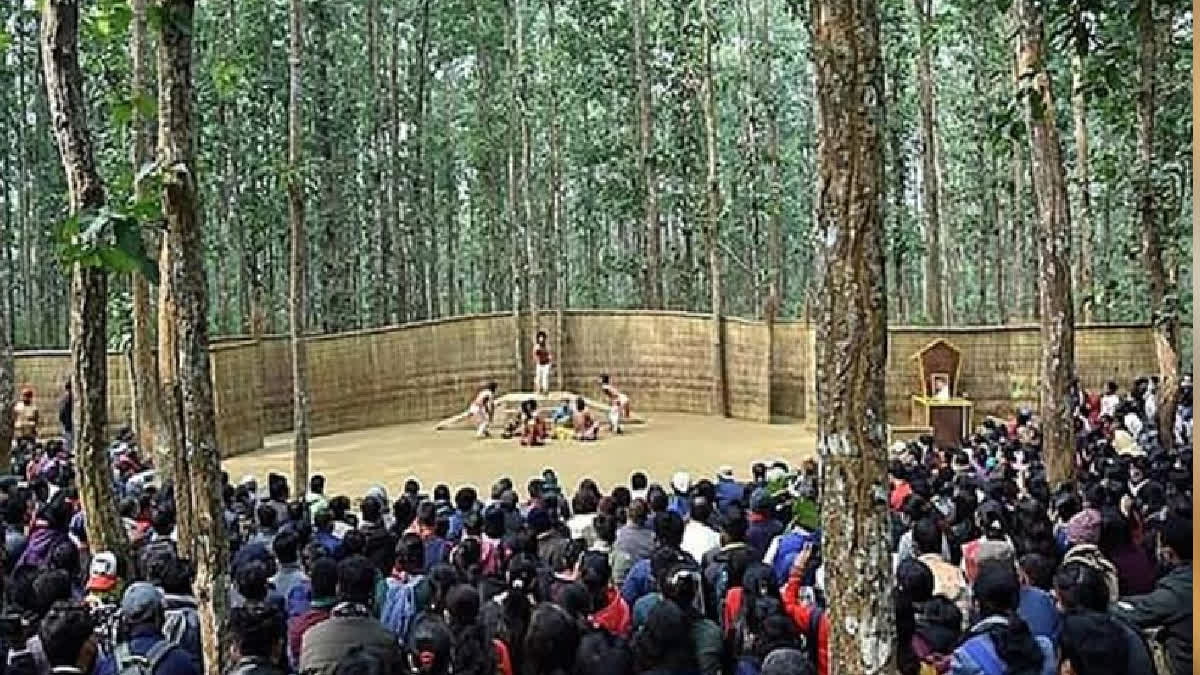Goalpara: As experimental theatre grows across India, a quiet theatre movement is celebrating its silver jubilee at a remote location in Assam's Goalpara district. Away from the pomp and gaiety of the theatre festivals, there are no elaborate arrangements here for the audience or the actors.
While the actors perform on earthen stage, the audience quietly takes their seats on the bamboo-made benches and the straws strewn on the floor around the stage. Artists perform in the natural daylight to avoid the electric lights and the chirping of birds sitting on the Sal tree around the stage creates the perfect ambience for the audience.
Welcome to the "Under the Sal Tree", a unique annual theatre festival at remote Rampur village in Agia of western Assam's Goalpara district. The organisers are celebrating 25 years of pioneering theatre practices that seamlessly blend art with nature.
This year too, the globally acclaimed three-day festival began on a high note with an opening ceremony graced by renowned painter Rabiram Brahma, who inaugurated the event. Following the inaugural session, the stage was set for the first performance of the festival, “Dadan Raja”, a Rabha language play, which captivated the audience with its evocative storytelling and connection to the ethnic roots.
Based in the village of Rampur in the Goalpara district, the social and cultural organisation, Badungduppa Kalakendra organises this unique theatre festival every year. The organisers comprise a group of 20 resident performing artists from nearby towns and villages. They create their own space, constructed with locally available low-cost bamboo, straw and cane.
Besides earning accolades through performances across various venues in India, Badungduppa Kalakendra conducts workshops and community-centred projects for performing artists. “Under the Sal Tree”, which has already created a niche for itself in the field of theatre over the years, has seen theatre groups from Bangladesh, North Korea, Bolivia, Holland, Brazil, Africa and Srilanka performing on its stage at Rampur over the years.
"Badungduppa, a Rabha word meaning soul-stirring music, was founded in 1998 by visionary theatre practitioner Sukracharjya Rabha in 1998. It was a dream of our founder Late Sukracharjya Rabha. There was no ambience for theatre here before 1998. But Sukracharjya believed that theatre can be a medium of change and he had achieved it through his dedication. Hundreds of people visit the theatre festival here every year and theatre groups from different parts of the world have already performed here all these years," said Madan Rabha, managing director of the Badungduppa Kalakendra.
The festival is called "Under the Sal Tree" which signifies the abundance of Sal trees that dot the entire landscape and under which the open stage as well as the audience gallery is constructed. The fact that the festival celebrates the art amid nature without electricity and noise and the use of sustainable materials has also earned a name as carbon neutral theatre festival, probably among the few in India and certainly the only one in Assam.
"Late Sukracharjya believed in the innate bond between art and nature. That is the reason he chose to hold the theatre amidst nature under the Sal tree. He believed that theatre could change and now we can see how true he was. Our village is a remote one but "Under the Sal Tree" has broken the geographical barrier long back. It's not that artists of Badungduppa go outside to perform their plays but people from different parts of the world have come to 'Under the Sal Tree' and performed, This is what Sukracharjya imagined and I am happy to see his dream materialising," said Cheena Rabha, wife of Sukracharjya Rabha. Sukracharjya Rabha died due to a cardiac arrest in 2018.
"I have seen theatre in different parts of the world but there is nothing like Under the Sal tree. It's magical. We come here every year and we sincerely want this to grow and continue. This is a unique festival of theatre. Of course, there is a change after the untimely death of Sukracharjya Rabha but his wife and the team have been keeping the spirit of the festival and I think it is going to be more interesting every year," said Meenakshi Barkotokey, a theatre enthusiast.
"Under the Sal Tree has come a long way all these years. Sukracharjya had many dreams. All the people here supported the organisation and the festival. We are now focusing on materialising the dreams of Sukracharjya. We hope with everyone's cooperation, we can achieve whatever he had dreamt," said Manjit Nath, an educationist and one of the active members of Badungduppa.
This year, the festival did not invite groups from abroad for performance as for the organisers, it is also a time for retrospection. Three books were released at the Badungduppa campus this year. These include “Resonance: Echoing the Spirit of Badungduppa” – a trilogical memorial book, “Sukracharjya Rabha on the Back Stage” – authored by Lakhikanta Rabha, and “Under the Sal Tree” – edited by West Bengal-based litterateur Avik Bhattacharya.
Thousands of theatre enthusiasts gathered at the bamboo galleries of the open-air theatre on the opening day. The atmosphere was vibrant which underscored the festival's far-reaching appeal. Audiences braved the winter chill, fully immersed in the captivating theatrical performances and the unique ambience of the festival.
On December 16, the festival featured two plays: “Kindhan Charithiram” (Tamil), which explored themes of societal change, and “Kisan Raj” (Hindi), addressing the struggles and resilience of farmers. Both plays received heartfelt applause for their compelling storytelling and impactful performances.
As the curtains fell this season of Under the Sal tree on Tuesday, a Rabha folk performance celebrating indigenous culture was performed followed by an open interactive session where theatre enthusiasts, artists, and scholars reflected on the 25-year journey of Badungduppa Kalakendra.



